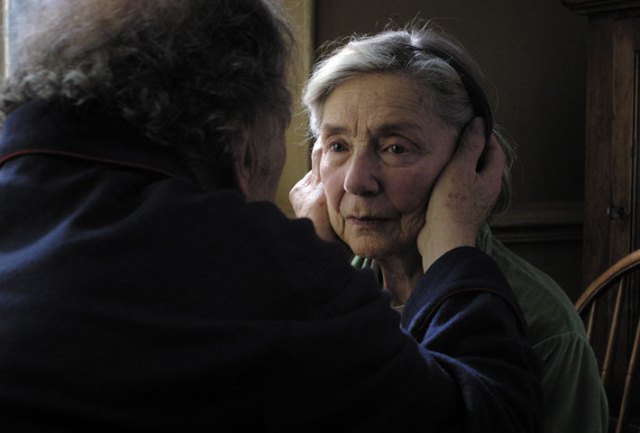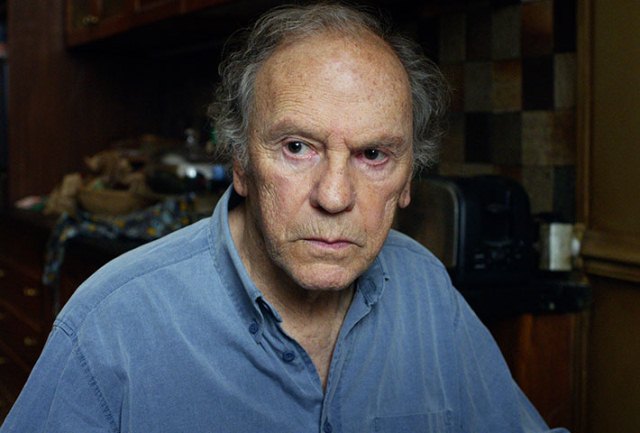CHICAGO – There is no better time to take in a stage play that is based in U.S. history, depicting the battle between fact and religion. The old theater chestnut – first mounted in 1955 – is “Inherit the Wind,” now at the Goodman Theatre, completing it’s short run through October 20th. For tickets and more information, click INHERIT.
Michael Haneke’s ‘Amour’ Turns Inevitability of Death Into Art
 Rating: 4.5/5.0 |
CHICAGO – One of the most shocking developments at yesterday’s Oscar nominations was the widespread inclusion of one of international cinema’s most controversial directors, Michael Haneke (“Caché,” “The White Ribbon”). His newest film, “Amour,” opening in Chicago theaters today, was nominated for Best Director, Best Original Screenplay, Best Actress, Best Foreign Language Film, and Best Picture of the Year.
It is a devastating and brutal portrayal of the final days of a multi-decade love affair, the end of the road we will all eventually reach and how we hope we will have a companion next to us when we do. Although even that brief description makes it sound more sentimental than it is. This is not sentiment. This is not melodrama. It is nearly clinical in its realism and, by being so, becomes true art. Haneke doesn’t offer easy solutions or pat emotions. He merely offers us a chance to eavesdrop and holds a mirror up to our own fears of old age, hopes for love, and challenges through life.

Amour
Photo credit: Sony Pictures Classics
Anne (Emmanuelle Riva) and Georges (Jean-Louis Trintignant) have what appears to be a happy, satisfactory life. They were both heavily involved with music and the film opens with the pair attending a concert performed by Anne’s former pupil. Shortly after that happy moment, Anne literally freezes at breakfast one morning. She stares off into space and doesn’t respond to Georges. He begins to get dressed to take her to the hospital when she suddenly snaps back to reality. It is arguably the most horrific scene of the year and it’s in something that’s far from a horror film because it conveys to the audience that things are not going well for Anne. We know from this moment, especially those of us who know the general trajectory of Haneke’s work, that the opening scenes of a deceased woman in her bed and Anne’s frozen moment will bookend a physical tragedy. And we know we are about to watch the final chapters of a true love story.
Anne had a stroke and her physical and mental decay is just beginning. Haneke frames most of his shots and shoots most of his action as a nearly detached observer. He often keeps his camera still, sometimes even in another room, as if we’re eavesdropping on a very private moment. And as Anne’s decay continues, the sense that we “shouldn’t be there” is amplified. I literally had to turn away at a few points, such as when Anne is yelling “hurts” as she’s being sponge-bathed, because I felt like I was invading a woman’s privacy. It felt wrong. And yet Georges can’t turn away. He must follow Anne to the end. That’s love.

Amour
Photo credit: Sony Pictures Classics
“Amour” is primarily a two-character piece (although Huppert hasn’t gotten nearly enough praise for her supporting work…I would have loved a sixth nomination for “Amour” for her over “Silver Linings Playbook”’s Jacki Weaver) and Haneke places all of his dramatic trust in two amazing actors, a pair who had largely retired but returned for a work that will be considered among the best of their career. In fact, Riva became the oldest Best Actress nominee in history yesterday and I think she has a definite chance to win. She’s stunningly good and is matched by Trintignant in a pair of performances with absolutely no artifice. There’s nothing flashy here, none of the typical crutches on which an actor relies. All they were asked to do was be truthful and they delivered with two of the best performances of the last several years.
“Amour” does reach a point, especially in the second half, in which I began to concern myself with Haneke’s artistic intent. Why tell this story? When does something go from drama to audience brutality? “Amour” is BRUTAL. It is an increasingly darkening room in which the air is getting harder to breathe. And to what end? I’m still not convinced the film is a masterwork along the lines of Haneke’s best but that’s coming from someone who would rank the director among the most talented filmmakers alive. I will say that it’s a movie I have been unable to shake even after seeing many others since my first viewing. It has stuck with me not like a typical film but like a true story, something that feels like it happened to someone I know. And although it may not be directly like the story of Georges and Anne, death is a truth that will someday happen to us all.
 | By BRIAN TALLERICO |



Amour: The Final Mystery
But please, what are your theories for what happened to Georges? Did he jump out a window, walk out into the streets and drown himself; take poison and die in bed?